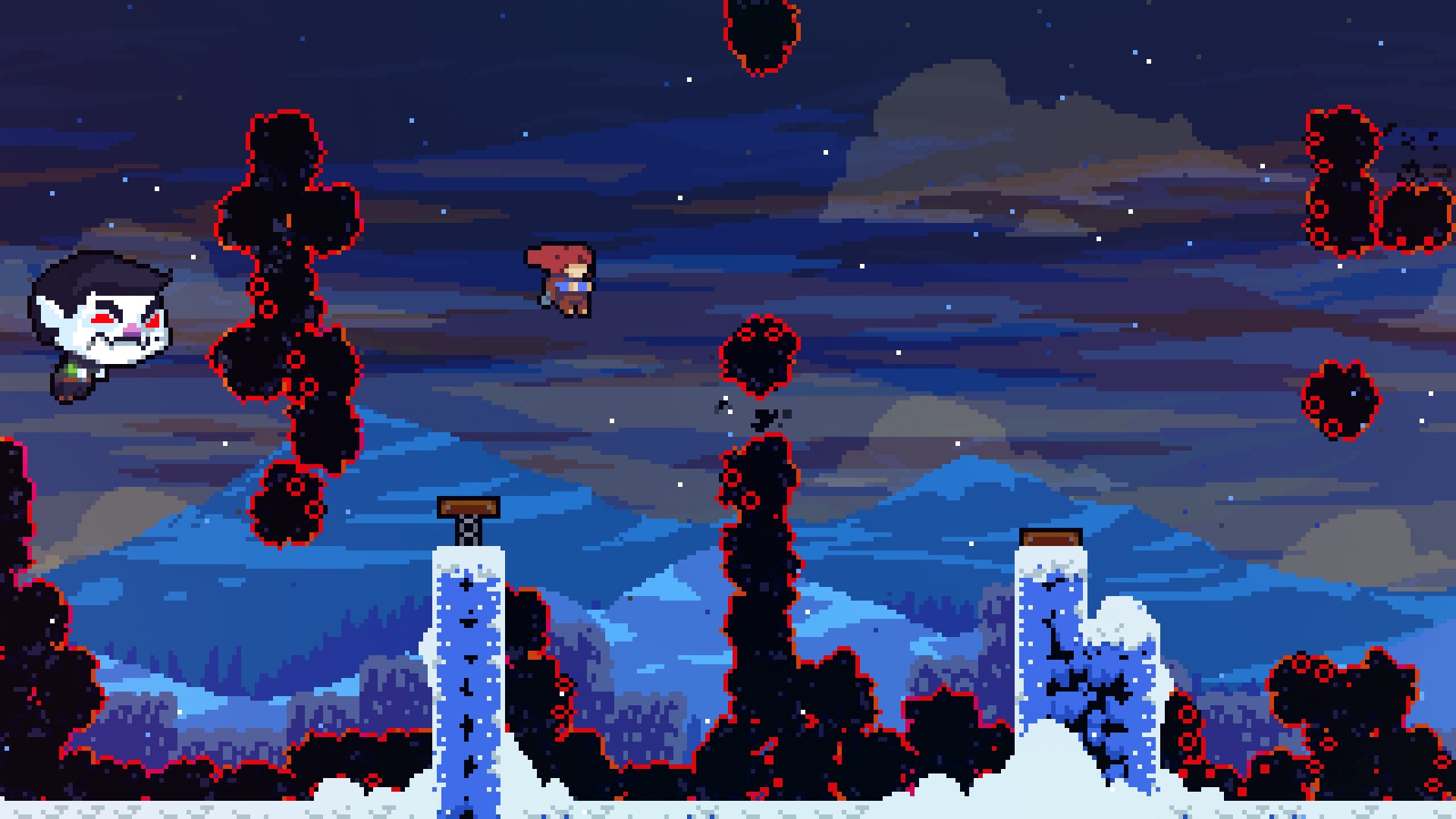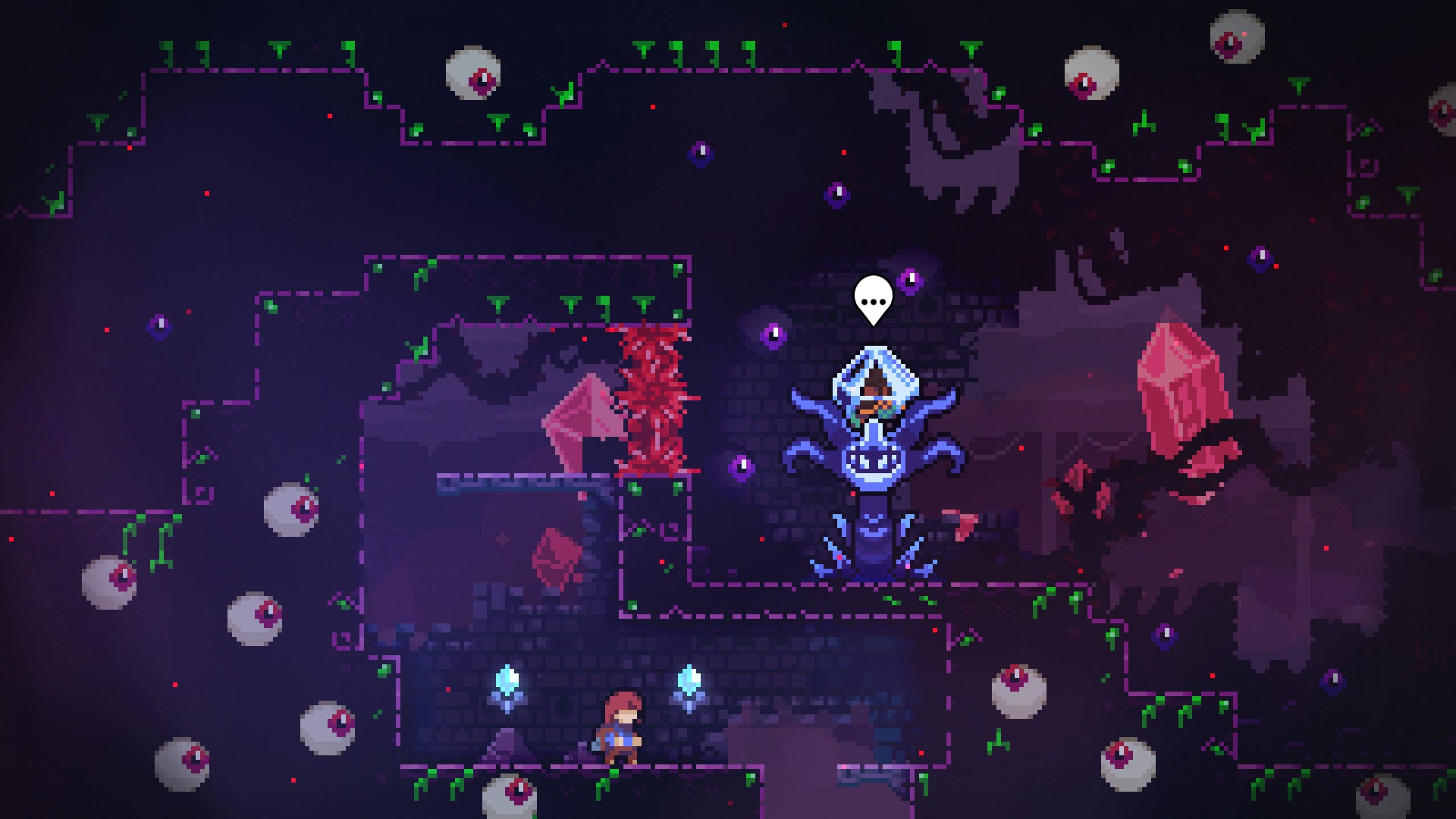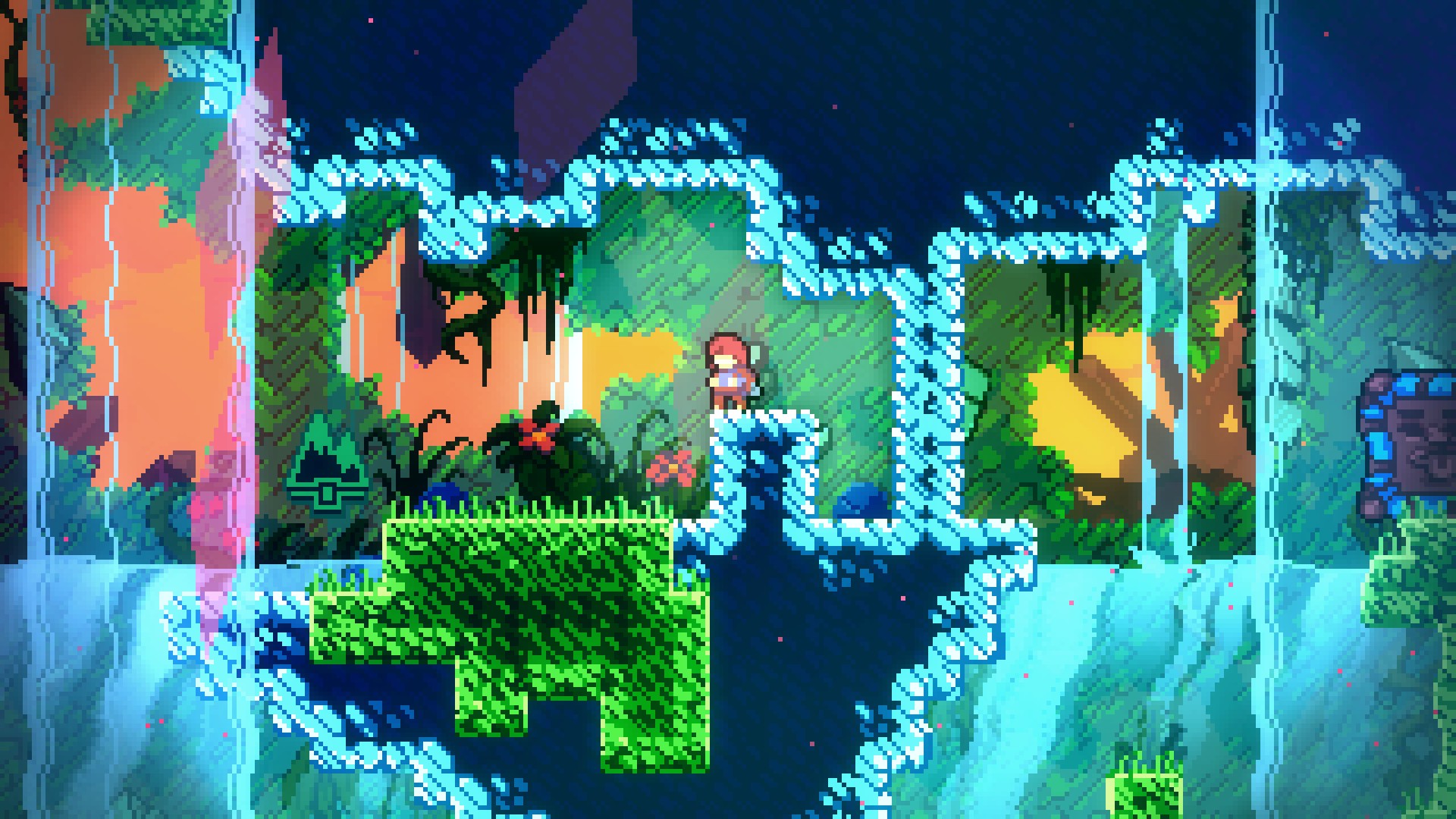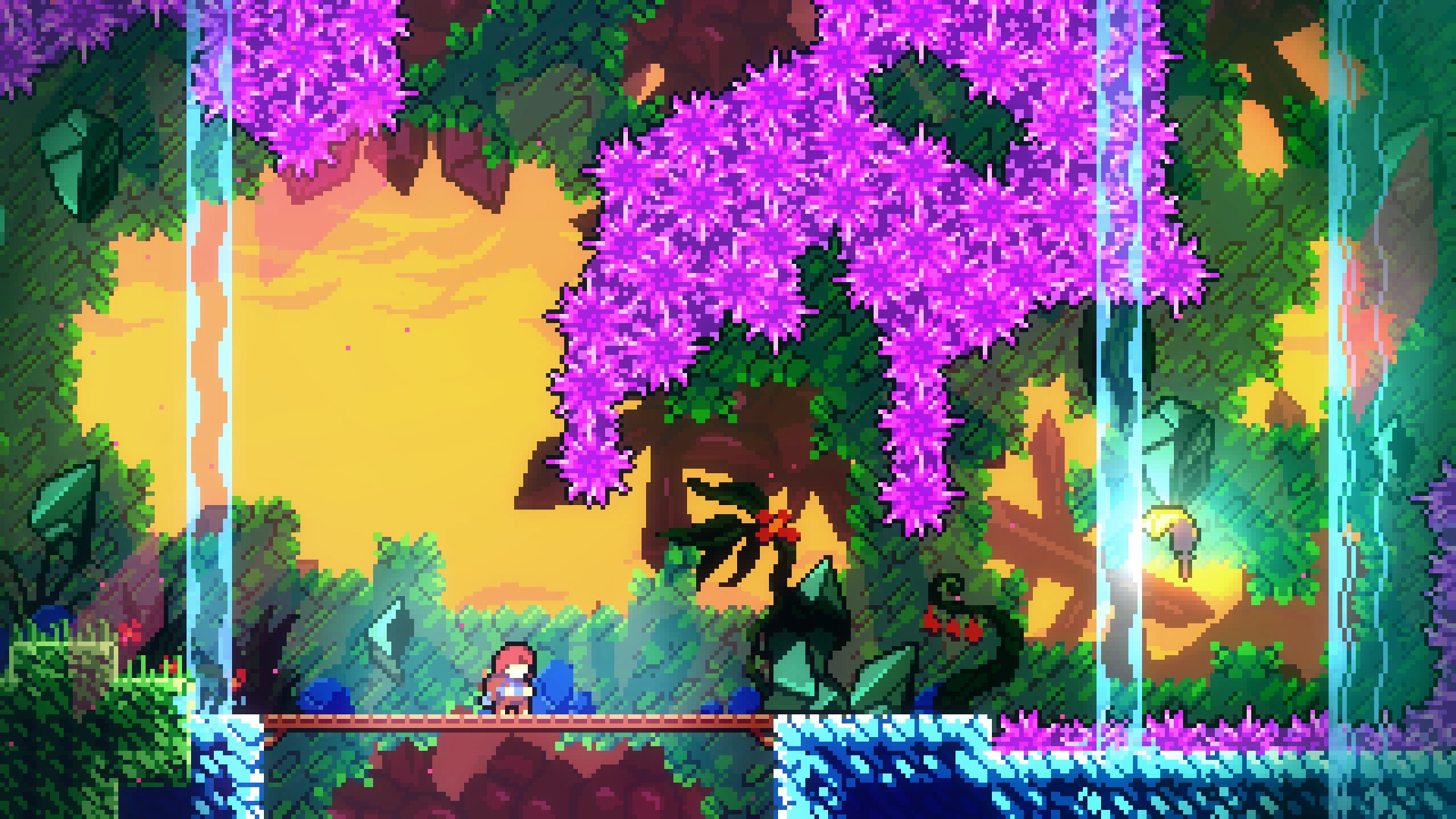Our Verdict
An engaging, vibrant and challenging platformer that adds narrative to a genre often shy of it.
PC Gamer's got your back
What is it? A challenging action platformer about climbing a mysterious mountain.
Expect to pay £18/$20
Developer Matt Makes Games Inc
Publisher Matt Makes Games Inc
Reviewed on Core i7-4720HQ, 16 GB RAM, GeForce GTX 980M
Multiplayer None
Link Official Site
Celeste is an adventure about overcoming adversity, and what better way to simulate adversity than with a punishingly difficult platformer? Don’t let that scare you, though. For those who have finished (or almost finished) the likes of Super Meat Boy, 1001 Spikes, and N++, Celeste probably won’t feel difficult at all. And that’s because, crucially, Celeste is a game that feels designed to accommodate people who can’t complete those games. Rather than being hard for its own sake (sometimes, in the right hands, a good thing), Celeste is hard for a reason that dovetails with its themes and narrative. And much like the demons that haunt the game’s protagonist, the difficulty does relent. You will finish this game. But if you’re like me, you’ll die upwards of 3,000 times doing so.
You play as Madeline, a mopey young girl hellbent on climbing the titular Celeste Mountain. It’s a tall, dangerous, seemingly haunted mountain: not the kind you’d normally want to climb. But Madeline does, because it seems to her that she can’t get anything else right in her life. She can’t make peace with herself or anyone around her, so why not dive headfirst into a superfluous and insurmountable challenge? Why not indeed.

It’s a twitch platformer: one must move with the utmost precision, usually very quickly, from the beginning of the screen to the end of it. Spikes, red ooze, fatal falls… all the usual environmental hazards are here, and they’ll all kill you on impact. Madeline can jump, dash (both mid-air and on the ground), and she can also climb walls and cliff faces. For the bulk of the game that’s all she can do, though certain environmental features, specific to each of the worlds, tinker with this format in a variety of ways. You’ll find jump pads, red glowing balls that hurtle you endlessly in any given direction, and green diamonds which, if touched mid-air, grant Madeline an extra mid-air dash. And this is just to name a few: Celeste never stops adding modifiers to its simple two-button platforming schematic, and most of them are centred around momentum.
Celeste has a ground-is-lava feel best captured recently in Ori and the Blind Forest
Some are better than others. Chaining jump dashes between green diamonds is a treat, as is manipulating directional blocks to leap deftly through levels. At times, Celeste has a ground-is-lava feel best captured recently in Ori and the Blind Forest, in the way it has you charging through the cosmos in a graceful, balletic dance.
I have to be pedantic though, and mention a certain “twist” that doesn’t work: wind. When it’s blowing in Madeline’s favour, it’s plenty of fun to course through the air and between hurdles at three times the normal speed. But the moments when she must press against it feel like navigating through treacle. In an otherwise brilliant and challenging platformer, these are among the most tedious moments I’ve experienced in a modern 2D game. Celeste is about snappy, die-and-immediately-try-again gameplay, and this goddamned wind is a huge momentum killer. I had to take a break from the game, not because a challenge was especially hard, but because the wind tied knots in my chest. It was just so annoying, in the way it undermined the thrill of learning the best course through a problem. Sure, you’re at high altitude, and sure, there would be wind. But the wind sucks, and videogames aren’t real. Thankfully, the especially grating examples of this are few and far between.

C'est la vie
What makes Celeste really interesting is the way it weaves its narrative around this twitch platforming template. Conventional wisdom states that if a platformer is to have a narrative worth following, it must usually be an exploratory Metroidvania affair, or else it must be easy, lest you not feel the gratification of closure. But this story of a young girl’s efforts to make peace with herself is full of story beats and, crucially, narrative justification for the feel of its gameplay. One can assume that scaling a scary and mysterious mountain is tough, but the reason Madeline is scaling it, and the things we learn about her as she does, lends a sense of urgency and purpose to this toughness.
The familiar pattern of failing and trying again, over and over, sometimes seemingly to no avail, is very much a part of Madeline’s frame of mind: whether she’s scaling a mountain or not. In this way, Celeste feels less like a niche game for fans of difficulty, and more like one that utilises its gameplay rhythms in a way that will feel meaningful to everyone. It helps that the platforming is leavened with more open-ended areas focused on light puzzling, and these often double as tutorials for the new elements that will prevail for the next few play sessions.

There are characters in Celeste, and while they’re cutesy (a trait you can blame for the Banjo-Kazooie-esque garbled speech) they’re all haunted by their own demons. There’s the crazed hotelier, the happy-go-lucky thrill seeker, the sour old woman, and importantly, the character known as Part of Me. This is basically the sullen, fatalistic version of Madeline, a haunted, spectral figure that naysays everything the protagonist does. “Are you the weak Part of Me, or the lazy part?” Madeline asks this spectre at one point, while on the receiving end of her naysaying. Part of Me replies: “I’m the pragmatic part.” Madeline’s determination could read as a banal retreading of the “anything is possible” motif so frequently ladled out by American cinema and blockbuster videogames, but the message isn’t quite as bluntly hopeful as that.
Ascension
But what really sets Celeste apart, aside from what many players will regard as window-dressing (the story), is the fact that you’ll finish it. Twitch platformers are my bread and butter, I love them, they’re the games I cherish the most. But I’ve never finished Super Meat Boy, I’ll never finish N++, and 1001 Spikes can die in a fire, though I love it dearly. I’m happy to play a game for as long as I’m capable and not finish it, but many aren’t. This game is for those who aren’t. Those looking for an especially caustic challenge can find cassettes throughout Celeste’s world which “remix” the game in dramatically devious ways, but I’m fairly certain that anyone, with the right amount of determination, can complete the core game. I did so in about ten hours. If you can finish Shovel Knight, you can finish this.

And that’s probably my favourite aspect of Celeste: it wields difficulty in a meaningful way, but not in a way that will solely appeal to masochists and speedrunners. It reminds me of The End is Nigh, in the way its difficulty is not just a longevity-oriented feature, but a core vehicle for helping the player understand what the game is about. It’s true that you’ll feel invested in Madeline’s story; it’s true that her mental and emotional trajectory is one you want to see come good. But overall, this is a twitch platformer that feels paced like a blockbuster action videogame: there are moments that allow you to breath and reflect, there are opportunities to feel strong and times you’ll feel hopeless. It knows when to give you a break, it knows when to really dig its claws in. I’d recommend 1001 Spikes to basically no one but myself, but I’d recommend Celeste to anyone.
An engaging, vibrant and challenging platformer that adds narrative to a genre often shy of it.

Shaun Prescott is the Australian editor of PC Gamer. With over ten years experience covering the games industry, his work has appeared on GamesRadar+, TechRadar, The Guardian, PLAY Magazine, the Sydney Morning Herald, and more. Specific interests include indie games, obscure Metroidvanias, speedrunning, experimental games and FPSs. He thinks Lulu by Metallica and Lou Reed is an all-time classic that will receive its due critical reappraisal one day.


